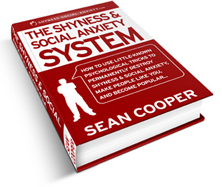How To Become Confident...Even If You’re Smart!

Ever notice how most doctors are confident?
If you walk into a doctor’s office and he (or she) acts like he knows what he’s doing, you’re going to trust his diagnosis and instructions.
You’re going to respect him and listen to what he says and believe it.
On the other hand, if he shakes when he’s handling his tools, is unsure of his actions and can’t quite look you in the eye or he stutters when he’s telling you his diagnosis, you’re going to think: “This guy doesn’t know what he’s doing!”
Does Confidence Have Anything To Do With Intelligence?
But is the confident doctor actually any smarter than the unconfident one? Does a confident person always know better than a nervous, awkward one?
Logically, the answer is no. Both doctors may be equally good. The nervous one may even be better. But humans are not logical creatures. We are driven by emotions. As much as you could try to logically convince yourself that both doctors could be equals, your gut feeling tells you a much different story.
Your gut tells you that the doctor who appears to be confident will know more and know it better than the doctor who is nervous. Your gut is subtly sending you the message: “Maybe there’s a reason why he’s nervous…”
That’s why confidence is important. People will make snap judgements about you based on how confident you appear. Can you blame them? They can only see you from the OUTSIDE.
But Are Doctors REALLY Confident?
It’s important that you GET THE FOLLOWING IDEA: The same doctor who can confidently save a person’s life or tell them they have a deadly sickness, will freeze up in an unfamiliar situation.
They may become nervous and anxious at the idea of talking to an attractive woman in a bar. This is because they are only confident in certain situations. This is important because it shows how confidence really works, something you’ll learn in just a minute.
The WRONG Way To Think About Confidence
Have you ever had to give a speech in front of a large group of people and wanted to “feel confident”? If so, you may have tried some different techniques to make yourself confident just so you could get through that speech.
The techniques may or may not have worked. If they did, the feeling probably only lasted for a few hours or a day. This is because you were trying to trick yourself into feeling confident. Smart people can’t trick themselves for long…
Here’s How Confidence REALLY Works:
The kind of confidence you want is not to “feel confident” when you desperately need to. Your confidence has to be formed from knowing you are a person who can handle yourself in most social situations.
Instead of tricking yourself into feeling confident, you have to base it on your actual abilities. In other words, confidence comes from knowing that you can do something through experience.
The doctor I mentioned before had already treated hundreds or thousands of patients. He KNEW he could do it, and do it well. Because of this, he never even has to think about being confident. It isn’t something he feels sometimes, it’s something he IS all the time.
On the other hand, the same doctor might become very nervous and anxious at the idea of approaching an attractive woman he doesn’t know at a bar. He can’t make himself confident if the abilities aren’t there. If he has no idea how to have a conversation and have fun at a bar, then he will won’t be confident. It wouldn’t make sense for him to be.
What This Means To You
In the same way, if you want to be confident in social situations, it usually isn’t enough to “want to feel confident”. You can’t just tell yourself to be confident, no matter how hard you try. THINKING about it won’t help! (Even if you do get yourself to feel more confident and friendly than usual, in a day or two it will wear off and you’ll be back to your usual base level of confidence. That sucks.)
Fortunately, there is a better way. You have to realize that…
Your Confidence Is Based On Your Actual Abilities!
This means that if you want to be more confident when speaking in front of people, you should first become better at it! And if you want to become more confident when having conversations, you should first get some basic conversational skills.
This is counter-intuitive to what most people teach, but it’s completely true! If you start playing a new sport, should you be confident when you suck at it, or do you become confident when you build your skills to a point where it becomes natural to tell yourself: “I’m not the best in the world at this, but I’m pretty good, based on the number of goals I score per game. I’m pretty confident I’ll play reasonably well in most games. There isn’t really anyhting to worry about.”
How To Raise Confidence…Even If You’re Smart!
Some shy people think that only loud, dumb people are confident. That’s because the loud, dumb people know that they have some social skills. They know they won’t get awkward and can handle being under social pressure.
It’s not about getting yourself to “act” confident, it’s about raising your base level of confidence by improving the areas you are weak in. Once you improve, you can then look at yourself and KNOW that you are okay in certain areas, like having conversations or making small talk.
To raise your level you have to first learn some new skills to actually become better at doing stuff. First you get better, you see yourself getting better, and then you become more confident, not the other way around.
The Big Picture of Confidence
Here’s some of the ideas I’ve talked about in this article:
- People judge you based on how you appear to be because they can only see you from the OUTSIDE.
- People, just like doctors, are only confident in certain situations.
- To become confident in social situations, you must first learn some basic social skills. After you develop your skills, you will see that it’s only natural for you to be confident in your abilities.
- You aren’t confident because it doesn’t make sense for you to be. You don’t have the skills and experience in social situations to back up any sort of confidence.
- You have to build your base level of confidence by improving your outer skills first. The skills are the cause, confidence is the effect, not the other way around.
Yours in Social Success,
Sean Cooper

Sign Up For Your FREE Member Newsletter
Liked This Article? Enter your email below to get my latest strategies and tactics on overcoming shyness and social anxiety sent straight to your inbox.
When you sign up, you'll also get instant access to a free report I wrote called "The 3 Biggest Mistakes Shy and Socially Anxious People Make."





